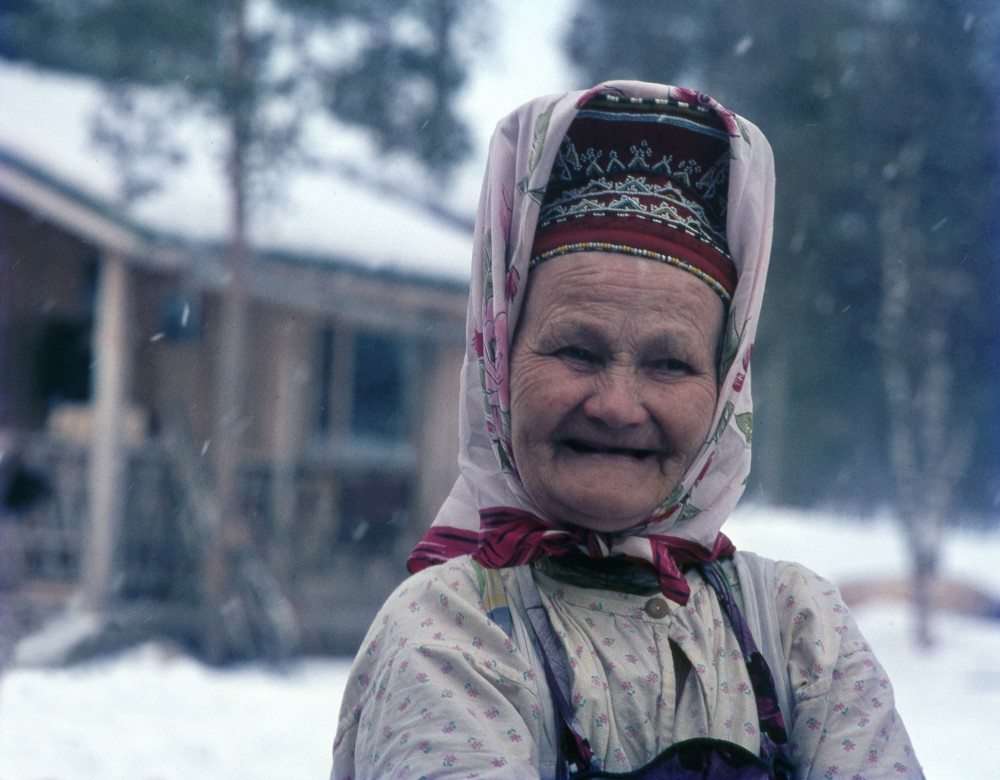Katja Gauriloff was born in Inari, Finland and is part of Lapland’s indigenous Sami Skolt tribe. Today she is a film director and co-owner of the Oktober Production Company. Her previous feature-length doc, “Canned Dreams,” premiered at the Berlin International Film Festival in 2012, before heading to Hot Docs and numerous other festivals all over the world. (Press materials)
“Kaisa’s Enchanted Forest” will premiere at the 2016 Hot Docs Film Festival on May 3.
W&H: Describe the film for us in your own words.
KG: This film is a story about lifelong friendship, the age-old Skolt Sámi legend of the Northern lights, and about our culture that was almost destroyed in WWII. This story is a tribute to my great-grandmother Kaisa, a celebrated storyteller and seer, my family, and my people.
W&H: What drew you to this story?
KG: I have always known the history of my great grandmother Kaisa, who was a very special person. After I found out there was film footage of her available, I knew I had a film on my hands.
W&H: What do you want people to think about when they are leaving the theater?
KG: Life is beautiful. You have to follow your heart. Also I want people to know something about the heritage of the Skolt Sami people.
W&H: What was the biggest challenge in making the film?
KG: There were many. This was the first time I have worked with animation, and dealing with archive material on such a large scale. Everything related to the archive material was challenging — finding the right material or getting rights for the footage I wanted. It didn’t always work out the way I expected.
With the animation it could sometimes be difficult to pass on my ideas to the animators and explain Sami culture to them. I also felt some difficulties working with a story that is so close to my family. Following the foreign point of view of Robert Crottet, who lived with Kaisa and her family in the 1930s, was the right and only choice for me to approach the subject.
W&H: How did you get your film funded? Share some insights into how you got the film made.
KG: It wasn’t very difficult, thanks to my producers. The Finnish Film Foundation, YLE (a national Finnish broadcaster), and AVEK (the Audio Visual Promotional Center) supported the film. We also received development financing from the European MEDIA Creative Europe Fund. For me, it was important that the Sami film center located in Norway also supported us, and we also got cultural support from the Sami parliament in Finland.
I got this film made not only with financial support but also with the support of my highly-valued colleagues. My editor Timo Peltola was a tremendous help when I felt the story was too difficult to make. I really appreciate how he got so deeply involved in the film with me.
W&H: What’s the biggest misconception about you and your work?
KG: The biggest misconception is that since I’m ethnically Sámi, I only make films with Sámi content — which is not true.
W&H: What’s the best and worst advice you’ve received?
KG: The best advice always comes from my producer and very best friend, Joonas Berghäll. He always knows how to inspire me to keep going.
The worst advice was from someone who told me that I should make small films. Okay — I’m small in size, but I didn’t quite understand what is “small” in a film. Is it a short film, small budget film, thematically narrow…?
W&H: What advice do you have for other female directors?
KG: Do what you love — have the courage to fly. Put the right people around you.
W&H: Name your favorite woman-directed film and why.
KG: I have to mention the Finnish filmmaker Pirjo Honkasalo. Her documentaries and fiction films have been a great inspiration to me — even before I started making my own films.







